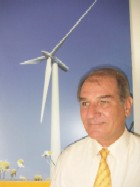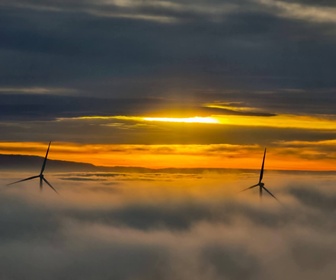Wind for Africa
 Is Africa the ‘Dark Continent’ in terms of installed wind power electricity generation and will it remain so? The well-nursed myth from the past that there is no wind in Africa, especially around the equator, is gradually being blown away. Access to basic, clean and affordable energy services is essential for sustainable development and poverty eradication. Community owned wind hybrid systems can be the starting point for achieving the Millennium Development Goals that prioritise water supply, health, connectivity and education needs. Africa has a large potential for grid-connected as well as stand-alone and mini-grid systems.
Is Africa the ‘Dark Continent’ in terms of installed wind power electricity generation and will it remain so? The well-nursed myth from the past that there is no wind in Africa, especially around the equator, is gradually being blown away. Access to basic, clean and affordable energy services is essential for sustainable development and poverty eradication. Community owned wind hybrid systems can be the starting point for achieving the Millennium Development Goals that prioritise water supply, health, connectivity and education needs. Africa has a large potential for grid-connected as well as stand-alone and mini-grid systems.By Hermann Oelsner, President, African Wind Energy Association
Africa, consisting of 52 countries, has a population of approximately 800 million people. More than 500 million of these people are without access to modern energy services. Five countries, South Africa, Egypt, Algeria, Nigeria and Libya, are responsible for 80% of the energy consumption in Africa. The average economic growth for Africa was 3.7% in 2003 compared with an average of 3.2% for the rest of the world. It is therefore clear that there is a huge need for energy services in Africa.
Government-owned vertically integrated companies that generate, transmit and distribute electricity dominate the electricity market in most African regions. Power demand has been increasing at a rate of 3% per year. A fast diminishing generation reserve surplus capacity will have a massive negative impact on the economies of the region. Proposed new fossil or nuclear plant installations are very expensive because of lack of infrastructure, and they have very long lead times. There are numerous hydropower projects on the drawing boards. The ambitious Inga hydropower scheme in the Democratic Republic of Congo (DRC) ultimately could generate 39,000MW. The major obstacle to the implementation, however, lies in the renowned instability of the region.
The aim is to construct an energy grid stretching from the equator down to the Cape, which would make it the longest cable in the world. This grid would be fed from large hydroelectric power stations, some of which have yet to be built, from the coal and nuclear power stations in South Africa, and from a number of gas-fired power stations. To quote Nobel Prize Winner Dr Hermann Scheer: ‘This “Power Pool”, regarded as exemplary, is in reality a monstrosity of organised foolishness and cultural devastation. It will cost too much to supply electricity to the villages where three-quarters of the region’s population live. The high-tension wires will therefore act as a magnet, hoovering up economic activity. The resulting mass emigration from rural regions will leave the elderly isolated in their villages, destroying family structures, and emigrants’ new homes under the corrugated tin roofs of the slums will be a breeding ground for prostitution, disease, dilapidation and violence.’
The switch to renewable energy has so far been hindered by the relevant decision-making bodies embedded in the framework of interests of the fossil resource industry – and that includes the governments of the African countries. The entire continent’s photovoltaic (PV) sales are less than 15MW per year. South Africa’s PV Solar Home Systems project, which promised to light up hundreds of thousands of individual households, turned into a fiasco, and barely reached 10,000 before faltering. And the World Bank’s PV-MTI US$ 5 million project in Kenya has only managed about 200 systems over 5 years. Except for two large wind farms in northern Africa, the rest of the continent has no significant installed wind electricity generation facilities. The significant potential for wind power in Africa, however, cannot be exploited without help from more developed countries.
It does not help if the World Bank still ploughs much higher sums into supporting investments in new oil and gas fields, coal mining and fossil fuel power stations than into renewable energy projects. It does not help if EU financial assistance for wind/hybrid projects is restricted to Mediterranean Africa only. It does not help if the public good and social responsibility of governments is sacrificed for private profit and corporate greed and that instead of public systems mobilising to deliver essential needs such as food, water, medicines and energy, corporate globalisation is rushing ahead with corporatisation and privatisation.









